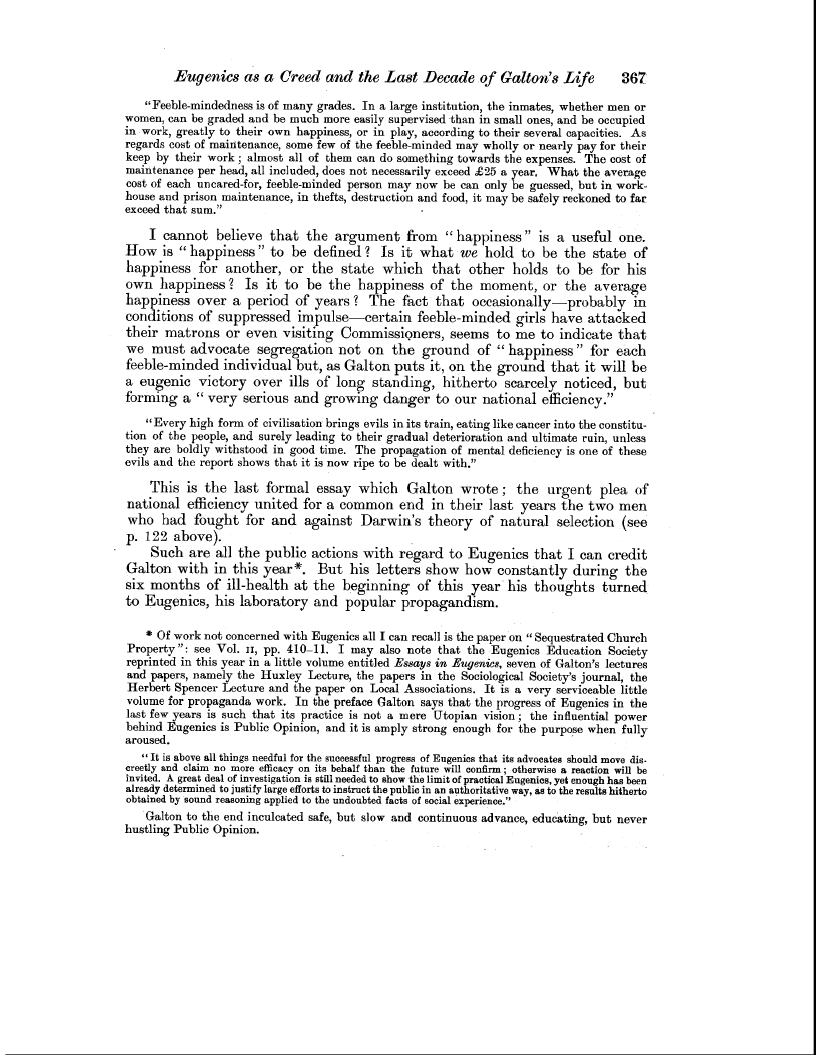| ||||||

OCR Rendition - approximate
Eugenics as a Creed and the Last Decade of Galton's Life 367 "Feeble-mindedness is of many grades. In a large institution, the inmates, whether men or women, can be graded and be much more easily supervised than in small ones, and be occupied in work, greatly to their own happiness, or in play, according to their several capacities. As regards cost of maintenance, some few of the feeble-minded may wholly or nearly pay for their keep by their work ; almost all of them can do something towards the expenses. The cost of maintenance per head, all included, does not necessarily exceed £25 a year. What the average cost of each uncared-for, feeble-minded person may now be can only be guessed, but in workhouse and prison maintenance, in thefts, destruction and food, it may be safely reckoned to far exceed that sum." I cannot believe that the argument from "happiness" is a useful one. How is " happiness" to be defined? Is it what we hold to be the state of happiness for another, or the state which that other holds to be for his own happiness ? Is it to be the happiness of the moment, or the average happiness over a period of years ? The fact that occasionally-probably in conditions of suppressed impulse-certain feeble-minded girls have attacked their matrons or even visiting Commissioners, seems to me to indicate that we must advocate segregation not on the ground of " happiness " for each feeble-minded individual but, as Galton puts it, on the ground that it will be a eugenic victory over ills of long standing, hitherto scarcely noticed, but forming a " very serious and growing danger to our national efficiency." "Every high form of civilisation brings evils in its train, eating like cancer into the constitution of the people, and surely leading to their gradual deterioration and ultimate ruin, unless they are boldly withstood in good time. The propagation of mental deficiency is one of these evils and the report shows that it is now ripe to be dealt with." This is the last formal essay which Galton wrote ; the urgent plea of national efficiency united for a common end in their last years the two men who had fought for and against Darwin's theory of natural selection (see p. 122 above). Such are all the public actions with regard to Eugenics that I can credit Galton with in this year*. But his letters show how constantly during the six months of ill-health at the beginning of this year his thoughts turned to Eugenics, his laboratory and popular propagandism. * Of work not concerned with Eugenics all I can recall is the paper on "Sequestrated Church Property": see Vol. ii, pp. 410-11. I may also note that the Eugenics Education Society reprinted in this year in a little volume entitled Essays in Eugenics, seven of Galton's lectures and papers, namely the Huxley Lecture, the papers in the Sociological Society's journal, the Herbert Spencer Lecture and the paper on Local Associations. It is a very serviceable little volume for propaganda work. In the preface Galton says that the progress of Eugenics in the last few years is such that its practice is not a mere Utopian vision ; the influential power behind Eugenics is Public Opinion, and it is amply strong enough for the purpose when fully aroused. " It is above all things needful for the successful progress of Eugenics that its advocates should move dis. creetly and claim no more efficacy on its behalf than the future will confirm; otherwise a reaction will be invited. A great deal of investigation is still needed to show the limit of practical Eugenics, yet enough has been already determined to justify large efforts to instruct the public in an authoritative way, as to the results hitherto obtained by sound reasoning applied to the undoubted facts of social experience." Galton to the end inculcated safe, but slow and continuous advance, educating, but never hustling Public Opinion.
|